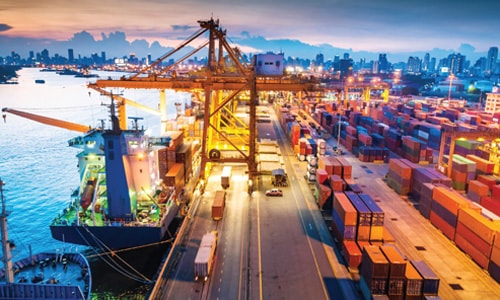Vietnam's industrial real estate benefits from US-China confrontation
Escalating trade disputes will slow down US and China industrial real estate, but Vietnam will benefit.
Jones Lang LaSalle (JLL) said that industrial real estate, which is booming thanks to the boost of e-commerce, may be directly and strongly impacted as the US-China trade dispute escalates.
JLL Chief Economist Ryan Severino said the tariffs imposed by the US on Chinese imports are an added cost to curb consumption, thereby reducing the need for warehouses to store goods. This move is unlikely to slow the growth of industrial real estate in the context of the booming e-commerce industry and the constant hunt for factory space by technology companies.
In the first quarter of 2018, China’s industrial vacancy rate was at a record low of 4.8%. In contrast, tariffs are likely to shave about 10 percentage points off real GDP in the US over the next 12 to 18 months, leading to a 20 percentage point decline in industrial rent growth, Severino said.
|
Industrial real estate in low-cost markets like Vietnam will benefit as the US-China trade dispute escalates. Photo:JLL |
However,Fluctuations in industrial land rental prices in China will push Vietnam to become the next destination for investors, thanks to its favorable geographical location and affordable labor costs..
Manufacturers are looking to move out of China to save costs, under the China +1 strategy. The trade war will push many large manufacturing enterprises to come and set up new factories in cheaper markets like Vietnam.
The bigger challenge will be if the two sides continue to clash. If the White House implements an additional $200 billion in tariffs, GDP will fall by another 50 to 70 percentage points over the next 12 to 18 months, Severino said. That will reduce demand for industrial space, especially in coastal areas where import activity is high. Industrial rents could also fall by 50 to 100 percentage points.
Many experts have warned that the war shows no signs of stopping, and neither Washington nor Beijing has any intention of backing down. In an interview in July onCNBC,President Trump has threatened to impose tariffs on all products imported from China, a reference to the $505 billion worth of goods imported from China in 2017, according to the U.S. Census Bureau.
Ryan Severino assessed that this large-scale tax increase will soon have serious and lasting consequences for the economies and industrial markets of the two countries, although developments show that it is unlikely to lead to an economic recession.
The latest round of tariffs continues to roil the commercial real estate industry. Tariffs on steel, aluminum and lumber – imposed in the first three months of 2018 – have increased construction costs and will slow project development.
Softwood lumber prices rose 19.5% in July from a year earlier, according to the Bureau of Labor Statistics’ Producer Price Index (PPI). Plywood also rose 22.5%, young steel rose 12.4%, and extruded aluminum rose 17.8%.
“The trade war is disrupting and delaying many new projects. While new supply is lacking, existing buildings will increase in value because of the shortage of supply and will slow economic growth,” Mr. Severino predicted.





.jpg)



